
Edward George Earle Lytton Bulwer-Lytton, 1st Baron Lytton,, was an English writer and politician. He served as a Whig member of Parliament from 1831 to 1841 and a Conservative from 1851 to 1866. He was Secretary of State for the Colonies from June 1858 to June 1859, choosing Richard Clement Moody as founder of British Columbia. He was created Baron Lytton of Knebworth in 1866.

Edward Robert Lytton Bulwer-Lytton, 1st Earl of Lytton,, was an English statesman, Conservative politician and poet who used the pseudonym Owen Meredith. During his tenure as Viceroy of India between 1876 and 1880, Queen Victoria was proclaimed Empress of India. He served as British Ambassador to France from 1887 to 1891.

Earl of Lytton, in the County of Derby, is a title in the Peerage of the United Kingdom. It was created in 1880 for the diplomat and poet Robert Bulwer-Lytton, 2nd Baron Lytton. He was Viceroy of India from 1876 to 1880 and British Ambassador to France from 1887 to 1891. He was made Viscount Knebworth, of Knebworth in the County of Hertford, at the same time he was given the earldom, also in the Peerage of the United Kingdom.

A Blighted Life is an 1880 book by Rosina Bulwer Lytton chronicling the events surrounding her incarceration in a Victorian madhouse by her husband Edward Bulwer-Lytton, 1st Baron Lytton and her subsequent release a few weeks later. This was at a time when men could lock up socially inconvenient female relatives in psychiatric institutions.
Henry Colburn was a British publisher.

Victor Alexander George Robert Bulwer-Lytton, 2nd Earl of Lytton,, styled Viscount Knebworth from 1880 to 1891, was a British politician and colonial administrator. He served as Governor of Bengal between 1922 and 1927 and was briefly Acting Viceroy of India in 1926. He headed the Lytton Commission for the League of Nations in 1931–1932, producing the Lytton Report which condemned the Japanese invasion of Manchuria and denounced Manchukuo as a Japanese puppet state.
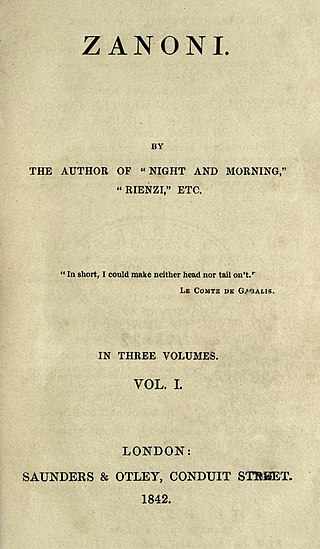
Zanoni is an 1842 novel by Edward Bulwer-Lytton, a story of love and occult aspiration. By way of introduction, the author confesses: "... It so chanced that some years ago, in my younger days, whether of authorship or life, I felt the desire to make myself acquainted with the true origins and tenets of the singular sect known by the name of Rosicrucians." A manuscript came into his hands written in what Bulwer-Lytton described as an "unintelligible cipher", a manuscript which through the author's own interpretation became Zanoni.
Elizabeth Barbara Bulwer-Lytton was a member of the Lytton family of Knebworth House in Hertfordshire, England.

Fashionable novels, also called silver-fork novels, were a 19th-century genre of English literature that depicted the lives of the upper class and the aristocracy.

Rosina Bulwer-Lytton, Baroness Lytton, was an Anglo-Irish writer who published fourteen novels, a volume of essays, and a volume of letters.
Richard John Warburton Lytton was an English landowner and member of the Lytton family. He was the father of Elizabeth Barbara Lytton, and the grandfather of Henry Bulwer, 1st Baron Dalling and Bulwer and Edward Bulwer-Lytton, 1st Baron Lytton.

The Disowned is a novel by the British writer Edward Bulwer-Lytton, originally published in three volumes. It is part of the then-popular genre of silver fork novels, focusing on British high society of the late Regency era. Like many other silver fork novels it was published by Henry Colburn, with the first volume coming out in 1828 and the latter two in 1829. It is set in the late eighteenth century but the political and social themes it refers to have more relevance to the contemporary 1820s.

Devereux is an 1829 historical novel by the British writer Edward Bulwer-Lytton, published in three volumes. It takes place during the reign of Queen Anne and partly revolves around a secret Jacobite plot to place the pretender James Stuart on the throne. He earned £1,500 for the novel from his publisher Henry Colburn, trebling his earnings from the successful silver fork novel Pelham of the previous year. He dedicated it to his friend the Canadian traveller and writer John Auldjo, then living in Naples. The story of a sibling rivalry between three brothers may have been influenced by Bulwer-Lytton's own upbringing.
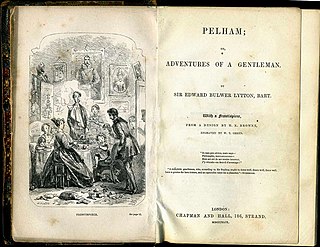
Pelham is an 1828 novel by the British writer Edward Bulwer-Lytton, originally published in three volumes. It was his breakthrough novel, launching him as one of Britain's leading authors. It is part of the tradition of silver fork novels that enjoyed great popularity in the late Regency and early Victorian eras. It follows the adventures of Henry Pelham, a young dandy, in Paris, London and the fashionable spa town of Cheltenham.
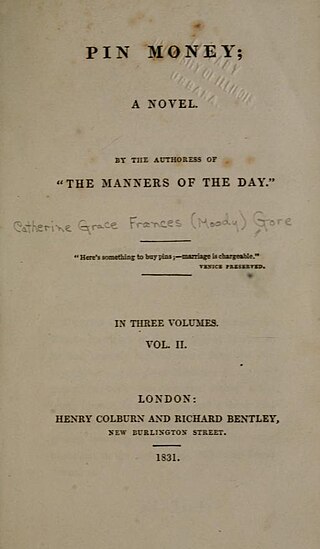
Pin Money is an 1831 novel by the British writer Catherine Gore, originally published in three volumes. It was part of the group of silver fork novels published during the later Regency era that focuses on life in the fashionable British upper classes. The Westminster Review considered the male characters to be more skilfully drawn than the female. Another review suggested that there was too much product placement in the novel, advertising the goods of various London shops.

The Cabinet Minister is an 1839 novel by the British writer Catherine Gore, originally published in three volumes. It is part of the tradition of silver fork novels popular during the era which focus on the upper-classes, and part of a subset of books which focus on British politics. It follows events in the Whig movement from the Regency Crisis of 1810 through the Great Reform Act in 1832 to the present in the early years of Queen Victoria's reign.
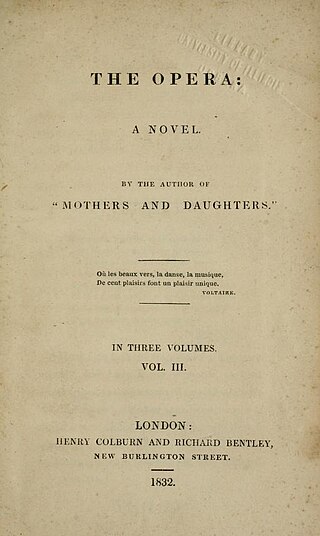
The Opera is an 1832 novel by the British writer Catherine Gore, originally published in three volumes. It is part of the tradition of silver fork novels focusing on British high society of the later Regency era. One contemporary reviewer launched a critical attack on its elitism, and lack of realism about everyday lives. The novel makes many references to the ongoing debate about the Reform Bill.
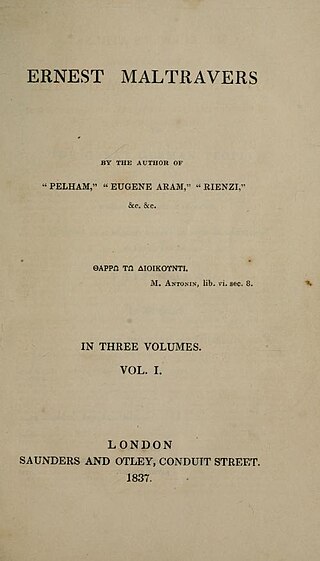
Ernest Maltravers is an 1837 novel by the British writer Edward Bulwer-Lytton, originally published in three volumes. It is Gothic in style, and features a protagonist combining "Byronic stature and Coleridgean philosophical ambition". It was followed by a sequel Alice.

Mrs. Armytage; or Female Domination is an 1836 novel by the British writer Catherine Gore, originally published in three volumes. It is a silver fork novel focusing on fashionable high society, a popular genre to which Gore contributed several books. The novel functions as an analogy for the contemporary political situation, with Gore advancing a pro-Whig viewpoint. It was very successful on its release, and was reissued by Gore's publisher Henry Colburn in 1848.

Women as They Are is an 1830 novel by the British writer Catherine Gore, originally published in three volumes.It is part of the silver fork novels focusing on fashionable high society of the later Regency era. It is also known by its subtitle The Manners of the Day. It was her first novel published by Henry Colburn, and was a considerable success. George IV described it as "the best bred and most amusing novel in my remembrance.

















